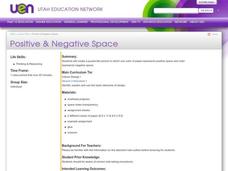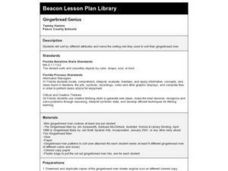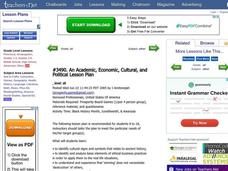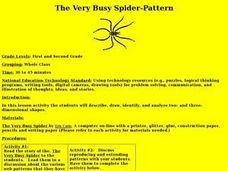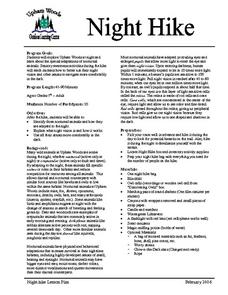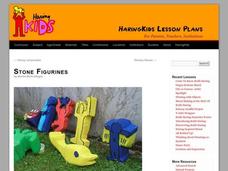Curated OER
Body Parts in Spanish
Students use Spanish to recognize and recall body parts. In this Spanish anatomy lesson, students identify and name the parts of the body in Spanish. Students describe a person physically by his hair and color of eyes. Students graph...
Curated OER
Positive & Negative Space
Learners review and differentiate between positive and negative space, view teacher sample, and cut out shapes to create puzzle-like picture in which one color of paper represents positive space and one color represents negative space.
Curated OER
This is Your Rock, This is My Rock
Students study the identity of rocks and minerals that can be found in Utah. They examine the characteristics that identify the rocks and minerals by using a hand lens and write them down on an index card. They role play as detectives by...
Curated OER
Octopus Legs
Students have oceans of fun transforming a wienie into an octopus they can eat! After counting, cutting halves and fourths, observing steam and the effects of heat, they mix colors as they create a yummy dipping sauce from mustard and...
Curated OER
Gingerbread Genius
Students sort gingerbread men, then identify the sorting rule that they used.
Curated OER
Showing Depth
Fourth graders examine and demonstrate how to create a middle ground, background, and foreground on a picture or work of art. They identify middle ground, background, and foreground on Michael Sowa's works of art, then create their own...
Curated OER
Cloud Viewer
Fourth graders examine different types of clouds. In this cloud lesson, 4th graders examine pictures of different types of clouds and read details about them in the captions under the images. They make a cloud viewer by cutting out the...
Curated OER
Let's Talk About Painting
Second graders identify the elements of the arts. In this visual arts lesson, 2nd graders read the book Matthew's Dream and discuss the elements of the arts. Students create their own paintings according to the style of specific artists.
Curated OER
Seahawk Educational & Environmental Discovery Program
Learners identify and describe local poisonous plant/animals. They compare characteristics of three local ecosystems and describe common plants from different ecosystems; comparing shapes, colors, textures, and measuring sizes.
Curated OER
Modern Mosaics (Grades 9-12)
Students explore the elements of contrast, emphasis, pattern, and color schemes by identifying how the artist manipulated tesserae in the mosaic. They create original mosaics by manipulating torn paper to depict different textures and...
Curated OER
An Academic, Economic, Cultural, and Political Lesson Plan
Students reflect on how many board games they've played have African Americans, their culture or history incorporated within. They identify four street games and three card games that appeal to African Americans. They play the...
Curated OER
The Very Busy Spider-Pattern
Students explore two- and three-dimensional shapes. In this very busy spider lesson, students read the story and then create a spider web pattern of their own. The webs must use a symmetrical pattern. Additional activities for patterns...
Curated OER
Science of Money
Students observe oxidation reaction in the lab using copper pennies. In this chemistry lesson, students examine a $1 dollar bill and record their observations. They explain how to identify counterfeit money using the iodine test.
Curated OER
Mushroom
Students identify the different types of mushrooms. In this biology lesson, students explore different mushroom experiments they can do at home. They discuss ways to extend sliced mushrooms' shelf life.
Curated OER
Night Hike
Learners explore Upham Woods at night and investigate about the special adaptations of nocturnal animals. They identify three nocturnal animals and how they are adapted to the night. Students explain what night vision is and how it works.
Curated OER
ABC Fun and Letter of the Week Activities
Students explore the alphabet. In this language arts lesson plan, students develop their fine motor skills as they participate in activities that require them to identify the letters of the alphabet.
Curated OER
Me on the Map: Homes, Neighborhoods, and Communities
Students read a book about maps and identify the differences between a picture and a map. For this maps lesson plan, students also label maps of their home, neighborhood, and community.
Curated OER
Thanksgiving : The Mayflower
First graders identify what a pilgrim is and what it was like to travel on The Mayflower. They are read, If You Sailed on The Mayflower in 1620 by Ann McGovern
Curated OER
Coin Hunt and It's Variations
Students play a game designed to give them practice identifying coin names and values. They form two lines with coins spread out in between the teams and when the teacher calls out a coin, the two in front scramble to find the specified...
Curated OER
Where in the World War? Mapping WWII in the Pacific
Students explore the Pacific Theatre of War. In this World War II lesson, students use reference material to access information about significant locations in the Pacific Theatre of War. Students identify the locations of the listed...
Curated OER
Stone Figurines
Students analyze visual arts by examining images on the Internet. In this figurine lesson, students research Keith Haring's artwork on the web and identify his body movement artistic style. Students utilize soft stones, carving tools and...
Curated OER
The Element of Color
Eighth graders study and analyze the elements of color by creating an personalized color wheel. Emphasis is placed on constructive criticism of student work by others for assessment. Students create short poems for their color wheel...
Catch My Party
Back to School Printables
Prepare your classroom for Back-to-School Night with this collection of printable displays. Including a Welcome Back sign, labels for classroom supplies, and table markers for a back-to-school buffet, this resource helps support teachers...
Curated OER
Life Sized Self Portrait
Students create a self-portrait that is compiled by using individual student drawings. The drawings emphasize line, shape, color and possibly texture depending upon the student's selection of materials.



